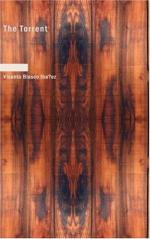Without turning her head she added, in a dreamy musing voice.
“Rafael, you don’t know Die Walkuere, do you? You’ve never heard the Spring Song?”
He shook his head. And Leonora, with her eyes still gazing moonward, her head resting back against her arms, which escaped in all their round, pearly strength from her drooping sleeves, spoke slowly, collecting her memories, recreating in her mind’s eye that Wagnerian scene of such intense poetry—the glorification and the triumph of Nature and Love.
Hunding’s hut, a barbaric dwelling, hung with savage trophies of the chase, suggesting the brutish existence of man scarcely yet possessed of the world, in perpetual strife with the elements and with wild animals. The eternal fugitive, forgotten of his father,—Sigmund by name, though he calls himself “Despair,” wandering years and years through the forests, harrassed by beasts of prey who take him for one of themselves in his covering of skins, rests at last at the foot of the giant oak that sustains the hut; and as he drinks the hidromel in the horn offered to him by the sweet Siglinda, he gazes into her pure eyes and for the first time becomes aware that Love exists.
The husband, Hunding, the wild huntsman, takes leave of him at the end of the rustic supper: “Your father was the Wolf, and I am of the race of Hunters. Until the break of day, my house protects you; you are my guest; but as soon as the sun rises in the heavens you become my enemy, and we will fight.... Woman, prepare the night’s drink; and let us be off to bed.”
And the exile sits alone beside the fireplace, thinking of his immense loneliness. No home, no family, not even the magic sword promised him by his father the Wolf. And at daybreak, out of the hut that shelters him the enemy will come to slay him. The thought of the woman who allayed his thirst, the sparkle of those pure eyes wrapping him in a gaze of pity and love, is the one thing that sustains him.... She comes to him when her wild consort has fallen asleep. She shows him the hilt of the sword plunged into the oak by the god Wotan; nobody can pull it out: it will obey only the hand of him to whom it has been destined by the god.
As she speaks the wandering savage gazes at her in ecstasy, as if she were a white vision revealing to him the existence of something more than might and struggle in the world. It is the voice of Love. Slowly he draws near; embraces her; clasps her to his heart, while the door is pushed open by the breeze and the green forest appears, odorous in the moonlight—nocturnal Springtime, radiant and glorious, wrapped in a mantle of music and perfume.
Siglinda shudders. “Who has come in?” No one—and yet, a Stranger has entered the hovel, opening the door with an invisible hand. And Sigmund, at the inspiration of Love, divines the identity of the visitant. “It is Springtime laughing in the air about your tresses. The storms are gone; gone is the dark solitude. The radiant month of May, a young warrior in an armor of flowers, has come to give chase to bleak Winter, and in all this festival of rejoicing Nature, seeks his sweetheart: Youth. This night, which has brought you to me, is the unending night of Spring and Youth.”




